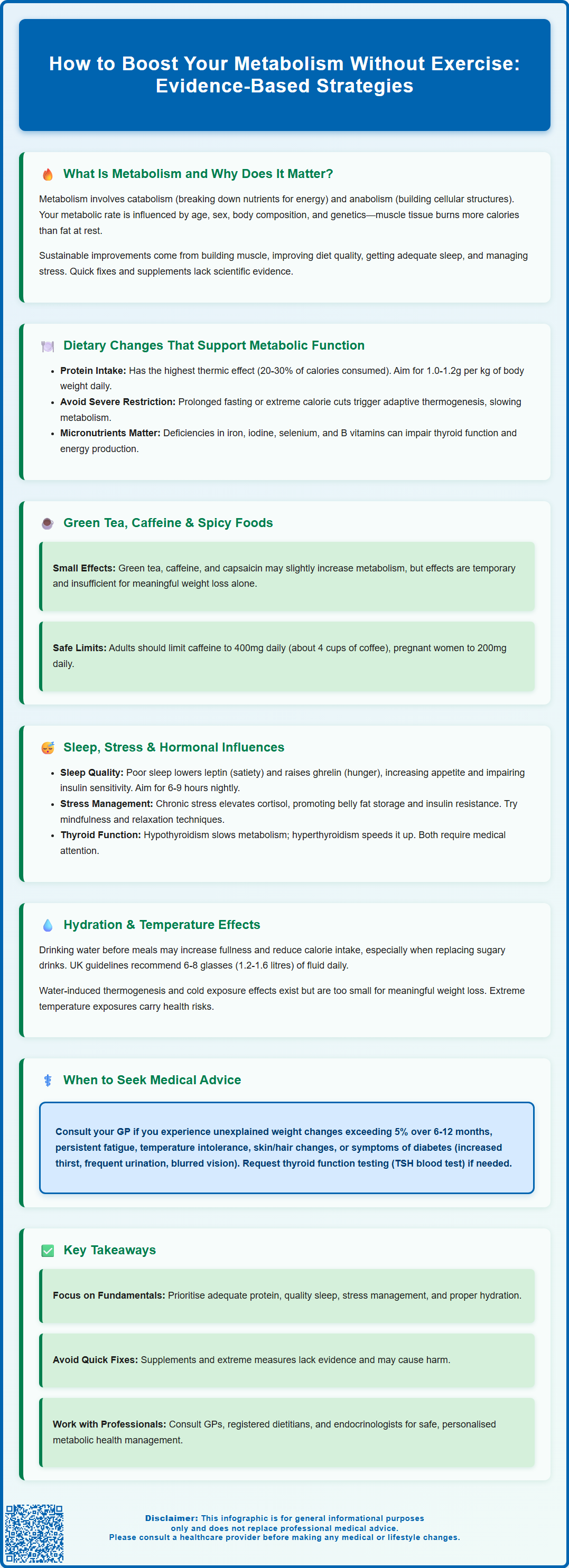Metabolism encompasses all biochemical processes that sustain life, determining how efficiently your body converts nutrients into energy. Whilst many seek ways to boost metabolism without exercise, it is important to understand that metabolic rate is influenced by factors including age, body composition, hormonal balance, and genetics. Modest improvements can be achieved through evidence-based dietary modifications, adequate sleep, stress management, and proper hydration. However, there is no quick fix or supplement that dramatically accelerates metabolism. This article explores practical, medically sound strategies to support healthy metabolic function and identifies when professional medical evaluation may be warranted for underlying metabolic disorders.
Summary: Metabolism can be modestly supported without exercise through adequate protein intake, regular meal patterns, quality sleep, stress management, and proper hydration, though dramatic metabolic enhancement is not achievable through lifestyle changes alone.
- Protein has the highest thermic effect of food at 20–30% of calories consumed, compared with 5–10% for carbohydrates and 0–3% for fats.
- Chronic sleep deprivation disrupts leptin and ghrelin hormones, impairing glucose metabolism and increasing risk of type 2 diabetes.
- Thyroid hormones regulate basal metabolic rate; hypothyroidism reduces metabolism whilst hyperthyroidism increases it, both requiring medical assessment.
- Severe calorie restriction triggers adaptive thermogenesis, whereby the body reduces energy expenditure as a protective mechanism.
- Unexplained weight loss exceeding 5% of body weight over 6–12 months warrants GP consultation to exclude underlying pathology.
- NICE guidance recommends thyroid function testing (TSH first-line) for persistent fatigue, temperature intolerance, or unexplained weight changes.
Table of Contents
What Is Metabolism and Why Does It Matter?
Metabolism refers to the sum of all biochemical processes that occur within the body to maintain life. It encompasses two primary components: catabolism, the breakdown of nutrients to release energy, and anabolism, the synthesis of compounds needed for cellular structure and function. The rate at which these processes occur is termed metabolic rate, commonly measured as the number of calories the body expends at rest (basal metabolic rate, or BMR) and during activity (total daily energy expenditure, or TDEE).
Your metabolic rate influences weight management, energy levels, and overall physiological health. Several factors determine individual metabolic rate, including age, sex, body composition, and genetic predisposition. Muscle tissue is metabolically more active than adipose (fat) tissue, meaning individuals with greater lean muscle mass typically have higher resting energy expenditure. Hormonal regulation—particularly thyroid hormones (thyroxine and triiodothyronine), insulin, cortisol, and sex hormones—plays a crucial role in modulating metabolic processes.
It is important to recognise that whilst lifestyle modifications can influence metabolic rate to some degree, the effect is often modest. There is no evidence to support the notion of dramatically 'boosting' metabolism through dietary supplements or quick fixes. Sustainable changes in body composition, dietary habits, sleep quality, and stress management offer the most reliable means of supporting healthy metabolic function. Understanding metabolism helps individuals make informed decisions about nutrition and lifestyle, and recognise when medical evaluation may be warranted for unexplained weight changes or fatigue.
Dietary Changes That Support Metabolic Function
Nutrition plays a fundamental role in metabolic regulation, though it is essential to approach dietary modification with realistic expectations. Protein intake is particularly relevant: the thermic effect of food (TEF)—the energy required to digest, absorb, and process nutrients—is highest for protein, at approximately 20–30% of calories consumed, compared with 5–10% for carbohydrates and 0–3% for fats. The UK Reference Nutrient Intake (RNI) for protein is 0.75g per kilogram of body weight daily for most adults, though slightly higher intakes (1.0–1.2g/kg/day) may be beneficial for older adults or during weight management with professional guidance. People with kidney disease should consult their GP before increasing protein intake.
Regular meal patterns may help stabilise blood glucose levels, though there is limited evidence linking eating frequency to significant metabolic enhancement. Avoiding prolonged fasting or severe calorie restriction is advisable, as these can trigger adaptive thermogenesis—a protective mechanism whereby the body reduces energy expenditure in response to perceived starvation. This metabolic adaptation can make sustained weight loss more challenging. Note that clinically supervised very low energy diets may be appropriate for some patients under NICE guidance.
Certain foods and beverages have been studied for potential thermogenic effects. Green tea and caffeine may modestly increase energy expenditure, though effects are typically small and transient. The Food Standards Agency advises adults limit caffeine to 400mg daily (about 4 cups of coffee) and pregnant women to 200mg daily. Spicy foods containing capsaicin may similarly produce minor, short-term increases in metabolic rate. However, these effects are insufficient to produce clinically meaningful weight loss without broader dietary and lifestyle changes.
Micronutrient adequacy is also important. Deficiencies in iron, iodine, selenium, and B vitamins can impair thyroid function and cellular energy production. In the UK, good sources of iodine include dairy products and seafood; high-dose iodine or kelp supplements should be avoided without medical advice. A balanced diet rich in whole grains, lean proteins, fruits, vegetables, and healthy fats provides the nutritional foundation for optimal metabolic health. Individuals considering significant dietary changes should consult a registered dietitian or healthcare professional for personalised guidance.

Sleep, Stress and Hormonal Influences on Metabolism
Sleep quality and duration exert significant influence on metabolic and endocrine function. Chronic sleep deprivation is associated with dysregulation of appetite-regulating hormones, particularly leptin (which signals satiety) and ghrelin (which stimulates hunger). Insufficient sleep reduces leptin levels and increases ghrelin, promoting increased caloric intake and preference for energy-dense foods. Additionally, sleep restriction impairs glucose metabolism and insulin sensitivity, increasing the risk of type 2 diabetes and weight gain over time.
The NHS recommends that most adults need 6–9 hours of quality sleep per night. Establishing consistent sleep-wake schedules, maintaining a cool, dark bedroom environment, and limiting screen exposure before bedtime can improve sleep hygiene and support metabolic health.
Chronic psychological stress activates the hypothalamic-pituitary-adrenal (HPA) axis, resulting in sustained elevation of cortisol. Elevated cortisol promotes visceral fat accumulation, insulin resistance, and increased appetite—particularly for high-calorie, palatable foods. Stress management strategies such as mindfulness-based interventions, cognitive behavioural techniques, and relaxation exercises may help mitigate these effects, though evidence for direct metabolic enhancement remains limited. NHS Talking Therapies (IAPT) services can provide support for stress management.
Thyroid hormones are master regulators of basal metabolic rate. Hypothyroidism (underactive thyroid) reduces metabolic rate and can cause fatigue, weight gain, and cold intolerance. Conversely, hyperthyroidism (overactive thyroid) increases metabolic rate, often leading to unintentional weight loss, heat intolerance, and palpitations. If you experience unexplained changes in weight, energy, or temperature tolerance alongside other symptoms, thyroid function testing may be warranted. NICE guidance recommends thyroid stimulating hormone (TSH) as the first-line test, with free T4 (and sometimes free T3) added if TSH is abnormal or if pituitary disease is suspected.
Hydration and Temperature Effects on Energy Expenditure
Adequate hydration is essential for optimal physiological function, including metabolic processes. Water is required for numerous biochemical reactions, nutrient transport, and thermoregulation. Some research suggests that drinking water may transiently increase energy expenditure through a process termed water-induced thermogenesis. This effect appears to result from the energy required to heat ingested water to body temperature and from sympathetic nervous system activation. However, the magnitude of this effect is modest and inconsistent in human studies, and insufficient alone to produce meaningful weight loss.
Drinking water before meals may support weight management indirectly by promoting satiety and reducing overall caloric intake, particularly when water replaces sugar-sweetened beverages. The Eatwell Guide, published by the UK Government, recommends consuming 6–8 glasses (approximately 1.2–1.6 litres) of fluid daily, with water being the preferred choice.
Cold exposure has garnered interest for its potential metabolic effects. The body expends energy to maintain core temperature when exposed to cold, a process termed cold-induced thermogenesis. Brown adipose tissue (BAT), a specialised fat depot that generates heat through non-shivering thermogenesis, may be activated by cold exposure. Whilst animal studies demonstrate significant metabolic effects, the clinical relevance in humans remains uncertain, and there is no official link between brief cold exposure (such as cold showers) and sustained metabolic enhancement. Those with cardiovascular conditions, older adults, and pregnant women should avoid extreme temperature exposures.
Similarly, hot environments and activities such as sauna use increase energy expenditure through thermoregulatory mechanisms, but effects are temporary and modest. Extreme temperature exposure carries risks, including hypothermia and heat-related illness, and should not be pursued as a primary metabolic intervention. Maintaining comfortable ambient temperatures and adequate hydration remains the sensible approach for most individuals.
When to Seek Medical Advice About Metabolism
Whilst modest variations in metabolic rate are normal, certain symptoms warrant medical evaluation to exclude underlying pathology. Unexplained weight changes—particularly unintentional weight loss of more than 5% of body weight over 6–12 months, or progressive weight gain despite appropriate dietary intake—should prompt consultation with a GP. Significant unexplained weight loss, especially when combined with other symptoms, may require urgent assessment in line with NICE suspected cancer referral guidelines (NG12).
Symptoms suggestive of thyroid disease include:
-
Persistent fatigue or lethargy
-
Cold or heat intolerance
-
Changes in skin, hair, or nail quality
-
Palpitations or tremor
-
Altered bowel habit
-
Menstrual irregularities
NICE guidance (NG145) recommends thyroid function testing for individuals presenting with these features. Testing typically begins with thyroid stimulating hormone (TSH), with free T4 added if TSH is abnormal or if pituitary disease is suspected. If thyroid dysfunction is confirmed, treatment with levothyroxine (for hypothyroidism) or antithyroid medications (for hyperthyroidism) can restore normal metabolic function under clinical supervision.
Type 2 diabetes and metabolic syndrome—characterised by central obesity, insulin resistance, dyslipidaemia, and hypertension—significantly impact metabolic health and cardiovascular risk. Symptoms such as increased thirst, frequent urination, blurred vision, or slow-healing wounds should prompt assessment by a GP or NHS 111. Testing may include fasting glucose or HbA1c (note that HbA1c is not suitable for diagnosis in pregnancy, children, or certain medical conditions).
Individuals experiencing persistent fatigue despite adequate sleep, or those with concerns about weight management that have not responded to lifestyle modification, should seek medical review. Investigations may include full blood count (to exclude anaemia), thyroid function tests, glucose and lipid profiles, and assessment for vitamin D or B12 deficiency. A holistic approach, potentially involving dietitians, endocrinologists, or other specialists, ensures that metabolic concerns are addressed safely and effectively. Self-diagnosis and unregulated supplements should be avoided, as these may delay appropriate treatment or cause harm.
Frequently Asked Questions
Can you significantly boost metabolism without exercise?
Whilst modest improvements in metabolic function can be achieved through dietary modifications, adequate sleep, and stress management, there is no evidence supporting dramatic metabolic enhancement without exercise. Sustainable lifestyle changes offer the most reliable approach to supporting healthy metabolism.
Does drinking water increase metabolic rate?
Drinking water may produce a small, transient increase in energy expenditure through water-induced thermogenesis, but this effect is modest and insufficient alone to produce meaningful changes in metabolism or body composition.
When should I see a GP about my metabolism?
Consult your GP if you experience unexplained weight changes exceeding 5% of body weight over 6–12 months, persistent fatigue, temperature intolerance, or symptoms suggestive of thyroid disease. NICE guidance recommends thyroid function testing for these presentations.
The health-related content published on this site is based on credible scientific sources and is periodically reviewed to ensure accuracy and relevance. Although we aim to reflect the most current medical knowledge, the material is meant for general education and awareness only.
The information on this site is not a substitute for professional medical advice. For any health concerns, please speak with a qualified medical professional. By using this information, you acknowledge responsibility for any decisions made and understand we are not liable for any consequences that may result.
Heading 1
Heading 2
Heading 3
Heading 4
Heading 5
Heading 6
Lorem ipsum dolor sit amet, consectetur adipiscing elit, sed do eiusmod tempor incididunt ut labore et dolore magna aliqua. Ut enim ad minim veniam, quis nostrud exercitation ullamco laboris nisi ut aliquip ex ea commodo consequat. Duis aute irure dolor in reprehenderit in voluptate velit esse cillum dolore eu fugiat nulla pariatur.
Block quote
Ordered list
- Item 1
- Item 2
- Item 3
Unordered list
- Item A
- Item B
- Item C
Bold text
Emphasis
Superscript
Subscript












